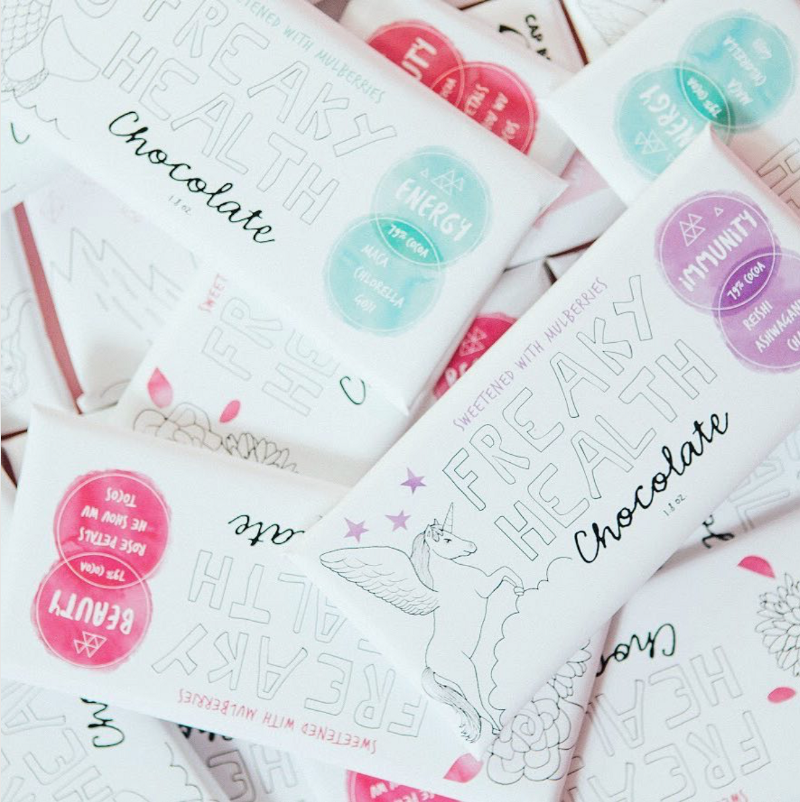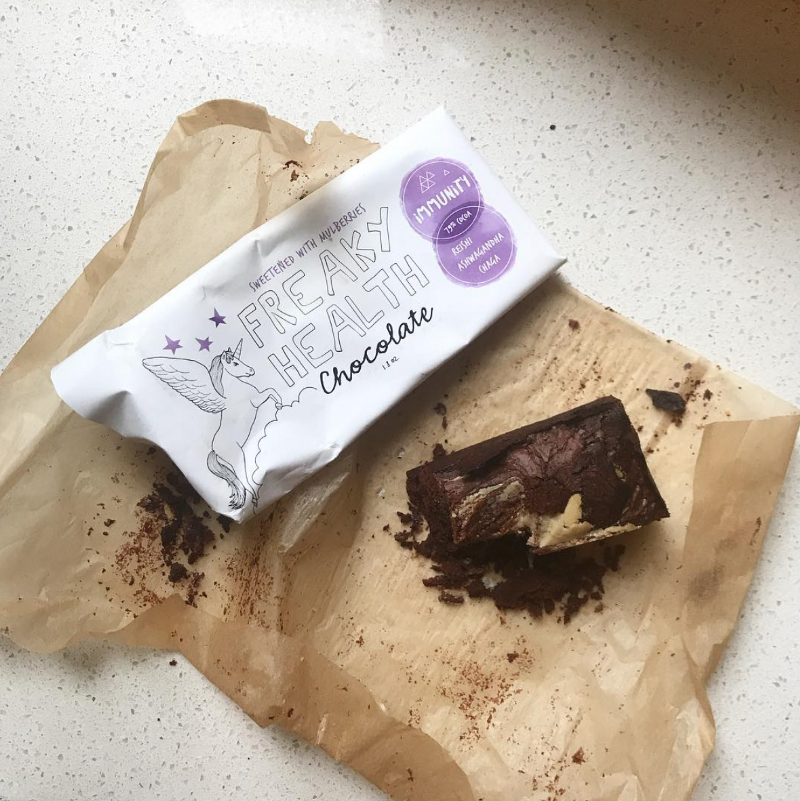
Everyone’s talking about medicinal mushrooms, ashwagandha, and a whole range of other words we struggle to pronounce. But what are they? Why are we eating them? And which ones are best for our body? We spoke with Karolina Palmer, the founder of Freaky Healthy Chocolate, who makes crazy, natural, superfood-filled chocolate bars, to learn more about these powerful ingredients.
Splendid Spoon: Hi Karolina! To start, can you tell us about adaptogenic herbs?
Karolina Palmer: Adaptogens are ancient ingestibles made up of roots, herbs, and mushrooms.
SS: Why are adaptogens suddenly so popular in the wellness world?
KP: We’re living in a time that our bodies are unprepared for. The constant onslaught of information and stimulation is manifesting as anxiety, depression, and stress. This ultimately leads to disease. Many folks are looking for long term, sustainable ways, to support their adrenal system and emotional wellbeing. Adaptogens do that in a non-invasive way.
SS: How did you begin your Freaky Healthy Chocolate journey?
KP: It was accidental. Before I developed the recipe for Freaky Health Chocolate, I had just had my second kid, and had taken a step back from working as a private chef. I got more interested in adaptogenic herbs and superfoods to support myself in that crazy postpartum period. [Never underestimate the power of moms solving their own problems and sharing their solutions! Just ask our founder, Nicole. — Ed.] I was invited to a “healthy potluck” and was trying to think of a fun way to introduce my friends to all the unusual sounding herbs I was gushing about. I scanned my pantry to see what would work and optimistically decided on chocolate.
At the time (about 3 years ago) I hadn’t seen any chocolate brands on the market with herbs and superfoods in them. The chocolate I made that night was a hit. It got me thinking about how I could help inspire more people to explore adaptogens in a fun and approachable way.

SS: Why chocolate?
KP: Chocolate and confections are an easy entry point into experimental ingredients because they’re a pleasurable experience. The thought of incorporating esoteric herbs can feel like adding another vitamin or supplement to your exhausting line up. It’s much more fun to get those benefits from a delicious bite of chocolate! Chocolate works great as a vehicle for herb delivery as the benefits of the herbs are better absorbed when combined with fat, which cacao naturally provides.
SS: Why did you choose to sweeten your chocolate with mulberries?
KP: A lot of people were telling me that they were super sensitive to stevia, so I was playing with the idea of using dried fruit to sweeten chocolate. Mulberries are high in antioxidants, and are a superfood in their own right. So I tried cacao and mulberries together and it was magic.
SS: What adaptogens should we be adding to our diet?
KP: I can’t speak for everyone but I feel generally stressed and anxious in our current world! Anyone else with me? I find that ashwagandha helps combat those feelings. I’m very interested in medicinal mushrooms and find their healing properties are tremendous. Everyone has to do their own research, but I would start by looking into those!

SS: How do you decide what superfoods and adaptogens go in each bar?
KP: I decide on a function and work backwards. For example, I chose “immunity” and looked into which herbs would provide the most support around that function, and which work symbiotically together. The reishi, ashwagandha, and chaga in the Immunity bar are known to restore, modulate stress, and boost immunity.
SS: Are certain adaptogens better for certain people? How do we know what’s best for us?
KP: Adaptogens don’t treat a specific condition. We’re all so dynamic: there’s no one formula for all people. That said, you can find herbalists in most areas, and even online, whom you can speak with. That person can really evaluate where you need more support and which adaptogens would help with that.
SS: What’s the best way to eat or drink adaptogens to get all the benefits?
KP: They come in different forms: capsules, tinctures, and powders. I mostly use powders as they’re the least processed. Ingesting them with a source of fat helps absorb the nutrients. If you make smoothies, that’s a great place to start incorporating them, as the smoothie will probably include a source of fat like nut milk, nut butter, or avocado. Tea and coffee are great vehicles for adaptogen powders too. The traditional belief is that by ingesting small amounts of adaptogens over a long period of time you’ll strengthen your endocrine system and bring your body into a greater state of harmony. So a little bit, most days, works well.
SS: Besides eating your amazing chocolate, what are your other self-care rituals?
KP: It depends on the day. I have two small children so some days self-care is waking up before them to have a quiet moment while I drink my coffee. It’s rarely a massage! But I’ve also recognized that the latest trendy self-care practice doesn’t always work for me. I like baths and tea just fine, but sometime self-care is Netflix. It’s not a competition to self-care more! Sometimes it feels like that thanks to social media!
SS: When do you feel most at peace?
KP: Music is important to me. And sound in general. I’m constantly curating playlists and listening back to them during the day. I love being near the ocean. Water is healing. I feel at peace walking outside barefoot whenever we’re out of the city. I try not to make the feeling of peace too out of reach or have too many rituals around it. If you can access peace with a smell or a sound, you can drop into it easily. Easy is the goal.
